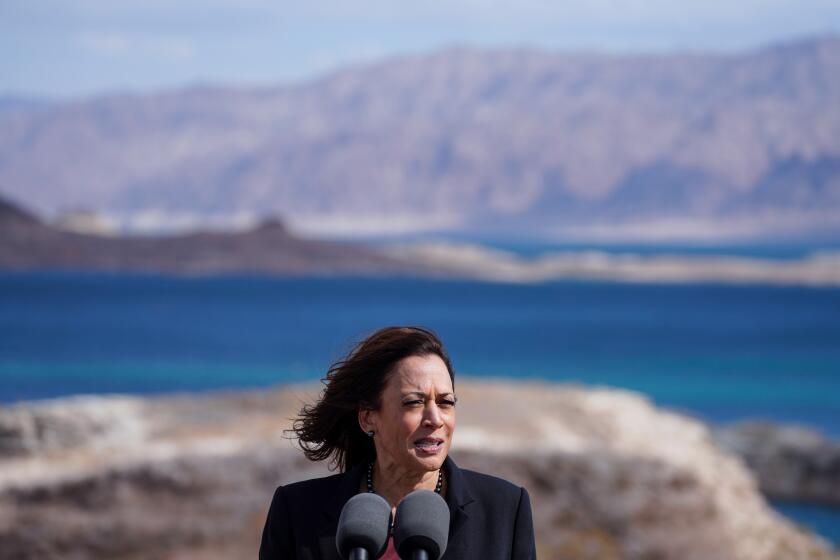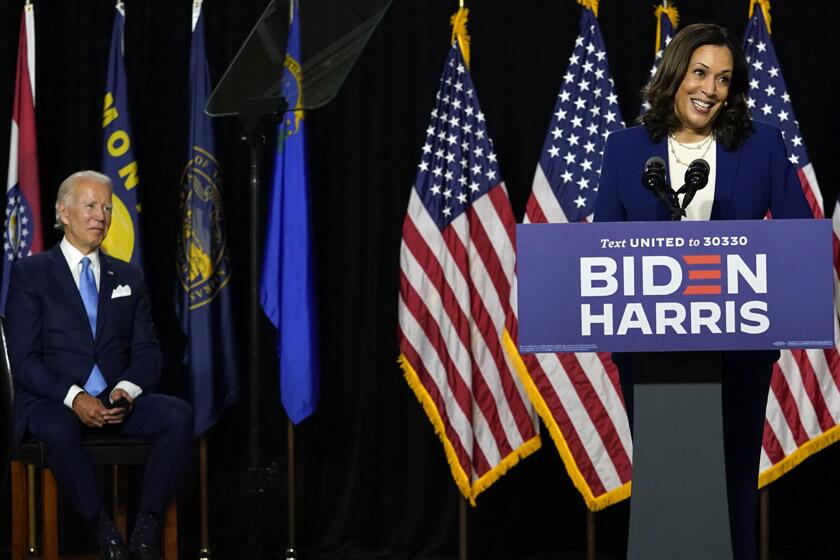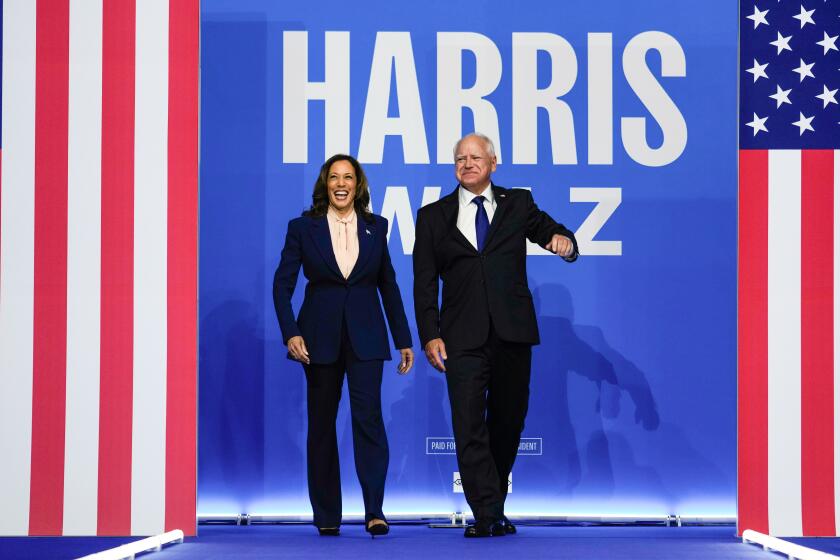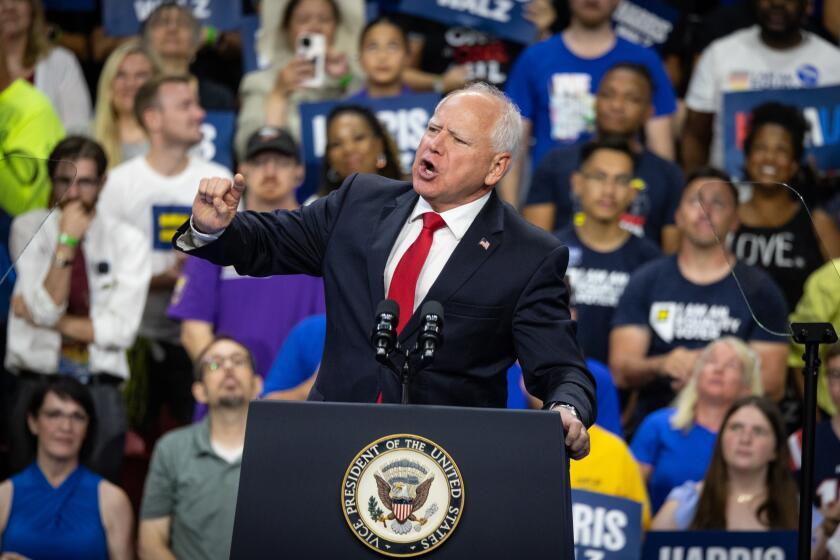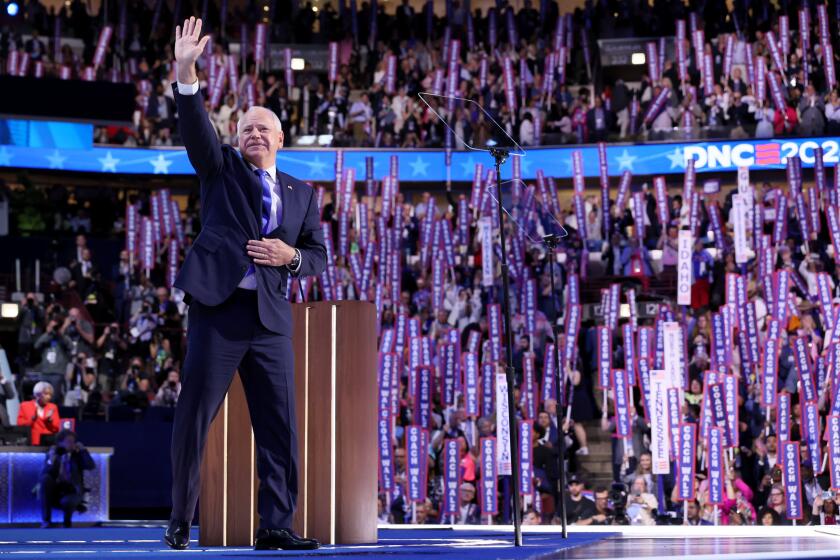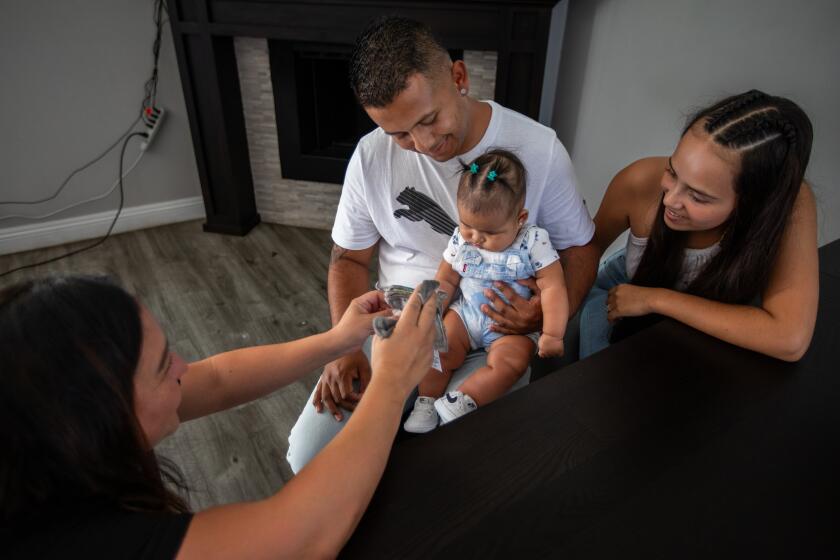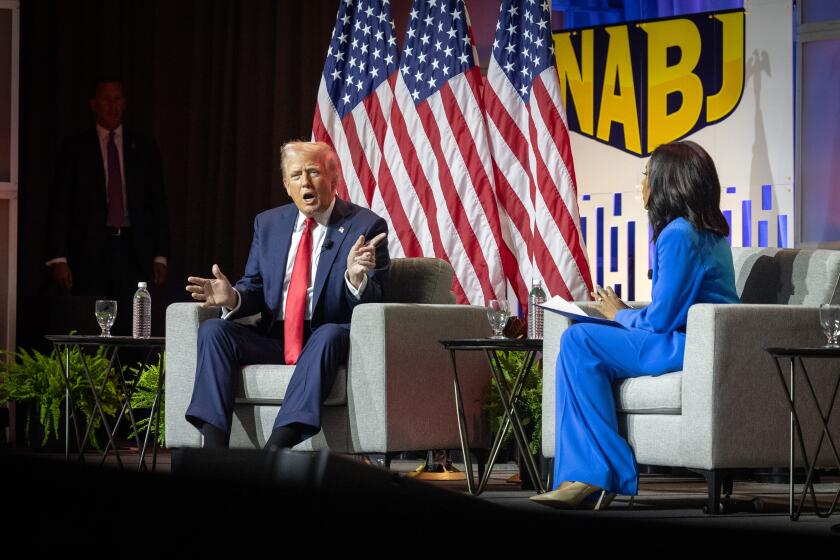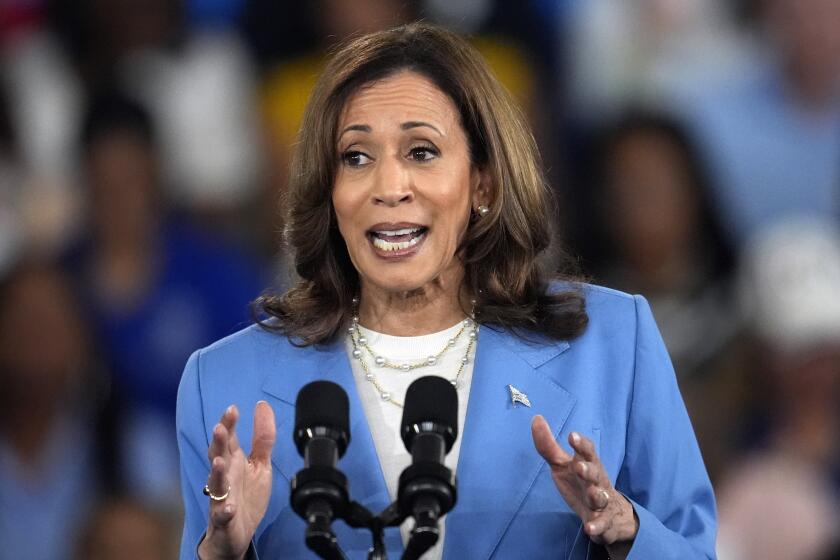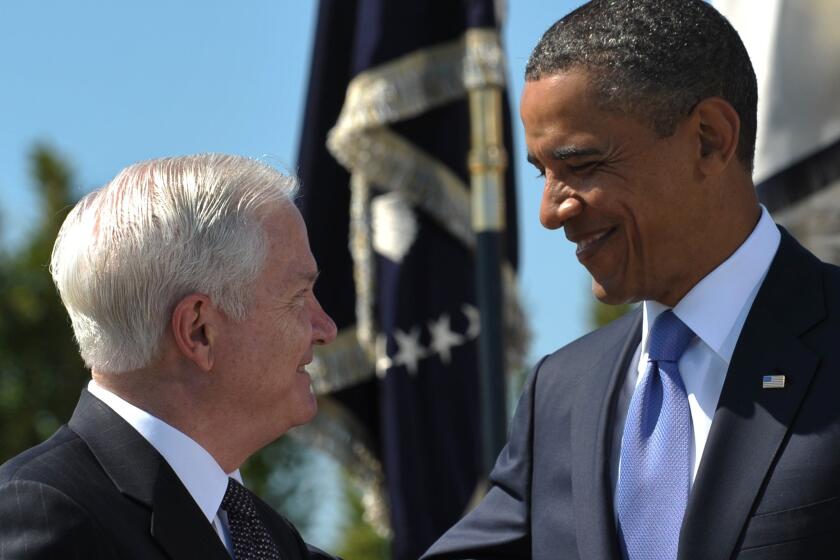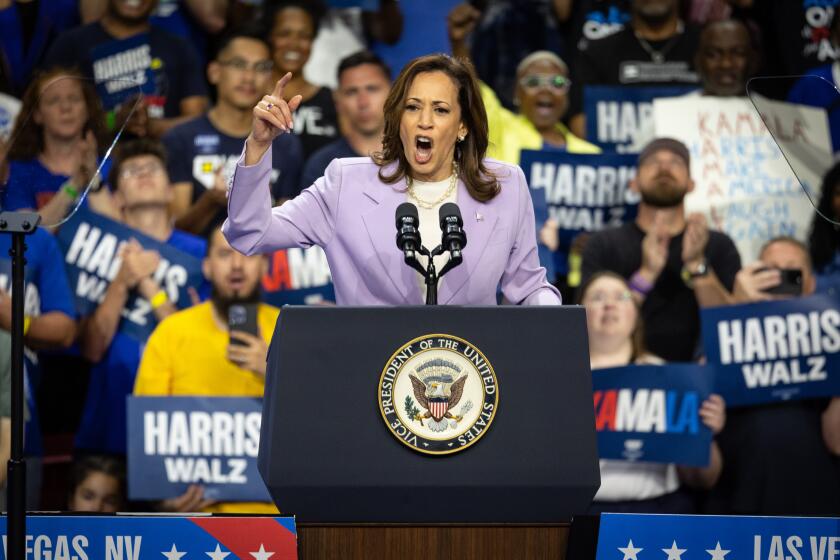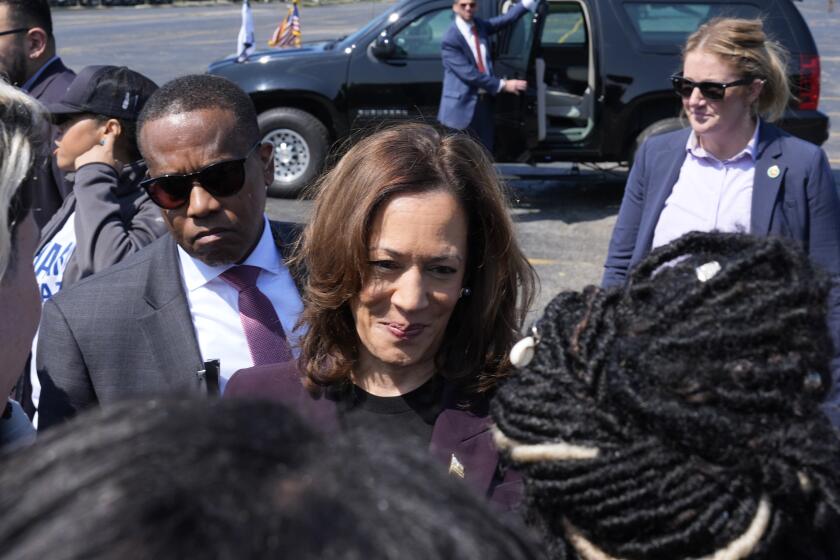- Share via
Trump pans the Harris-Walz interview in one all-caps word
Former President Trump responded on his Truth Social platform Thursday night to Vice President Kamala Harris’ and Tim Walz’s first sit-down interview with one word: “BORING!!!”
During the interview with CNN’s Dana Bash, Trump wrote that he looks forward “to Debating Comrade Comrade Kamala Harris and exposing her for the fraud she is.” The message included the repeated word.
Harris, asked why her position on fracking changed — in 2019, she said “there was no question” she was in favor of banning it, and she now says she does not support a ban — Harris said: “My values have not changed.”
Trump posted that she “rambled incoherently, and declared her ‘values haven’t changed.’”
“On that I agree, her values haven’t changed — The Border is going to remain open, not closed, there will be Free Healthcare for Illegal Aliens, Sanctuary Cities, No Cash Bail, Gun Confiscation, Zero Fracking, a Ban on Gasoline-Powered Cars, Private Healthcare will be abolished, a 70-80% tax rate will be put in place, and she will Defund the Police. America will become a WASTELAND!”
- Share via
Asked about shifting policy positions, Harris says her ‘values have not changed’
Confronted about shifting policy positions through her career, Vice President Kamala Harris said Thursday that her “values have not changed.”
She also said she believes it is “important to build consensus” and “to find a common place of understanding of where we can actually solve problems.”
On the Green New Deal, which her campaign has said she does not support, Harris said that she has worked on policy to address climate change and believes that “the climate crisis is real, that it is an urgent matter to which we should apply metrics that include holding ourselves to deadlines around time.”
Harris, a Californian who calls climate change an ‘existential threat,’ has prioritized investments in clean energy jobs and environmental justice.
On banning fracking, which she once supported but is a politically unpopular position in the key swing state of Pennsylvania, Harris said she has publicly opposed a ban since 2020 and stands by that. Fracking is the hydraulic fracturing of stores of natural gas or oil.
“In 2020, I made very clear where I stand. We are in 2024, and I have not changed that position, nor will I going forward,” she said. “I’ve kept my word, and I will keep my word.”
During a vice presidential debate in 2020, Harris said that “the American people know that Joe Biden will not ban fracking.”
Harris said the creation of hundreds of thousands of clean energy jobs has given her confidence that the crisis brought on by climate change can be addressed without banning fracking.
On immigration, Harris had previously indicated that she would be in favor of decriminalizing border crossing by undocumented immigrants. On Thursday, Harris said she has always wanted to hold violators accountable under the law, and has done so throughout her career.
Kamala Harris didn’t want to take on the immigration portfolio as vice president in the Biden White House, an unwinnable assignment.
“We have laws that have to be followed and enforced that address and deal with people who cross our border illegally, and there should be consequences,” she said.
She cited her tenure as California’s attorney general “prosecuting transnational criminal organizations, violations of American laws regarding the passage — illegal passage — of guns, drugs, and human beings across our border.”
- Share via
Harris offers new details about getting the historic call from Biden
Vice President Kamala Harris disclosed for the first time Thursday how she learned that President Biden would not seek reelection, which set in motion the path that led her to quickly become the Democratic 2024 White House nominee.
“My family was staying with us, and including my baby nieces, and we had just had pancakes,” she said on CNN in her first major interview since officially becoming the party’s standard bearer. She said the little girls asked, “Auntie, can I have more bacon?”
Harris, known for her enjoyment of cooking, responded that she would make more bacon and then they would work on a jigsaw puzzle. And then the phone rang.
“It was Joe Biden, and he told me what he had decided to do, and I asked him, ‘Are you sure?’ And he said, ‘Yes.’ And that’s how I learned about it,” Harris said.
Now that Biden has officially dropped out of the 2024 election, let’s talk about Harris.
Interviewer Dana Bash asked if Harris sought Biden’s endorsement. The vice president did not answer directly.
“He was very good. He was going to support me,” she said. “My first thought was not about me, to be honest with you. My first thought was about him.”
Harris, who fought against Biden for the 2020 presidential nomination, sometimes in deeply personal disagreements, went to lengths to laud his leadership throughout his lengthy political career.
“I think history is going to show a number of things about Joe Biden’s presidency. I think history is going to show that in so many ways, it was transformative,” she said, listing a series of accomplishments involving infrastructure, global alliances and investing in new industries.
“And I think history is going to show not only has Joe Biden led an administration that has achieved those extraordinary successes, but the character of the man is one that he has been in his life and career, including as a president, quite selfless and puts the American people first,” Harris said.
- Share via
Vibe check: Two candidates who seem like they’re still getting to know each other
It has been only 22 days since Kamala Harris tapped Minnesota Gov. Tim Walz to be her running mate. Since then, they’ve traveled around the country for appearances at boisterous rallies, and taken the stage as a team at the Democratic National Convention in Chicago.
Their partnership is, in a way, similar to that of Harris’ with President Biden. In both cases, the politicians were not close prior to their pairing. But the campaign trail has a way of turbocharging the get-to-know-you period, and Harris and Walz have spent a fair amount of time together this month.
Kamala Harris has selected Minnesota Gov. Tim Walz as her running mate. The moderate Democrat demonstrated the ability to work with Republicans when he was in Congress.
So, how’s the chemistry? In their joint interview with CNN’s Dana Bash, Harris and Walz appeared relaxed and comfortable in each other’s presence. When one of them spoke, the other often looked his or her way with a smile.
Walz was seated on Harris’ right, but the running mates were not exactly side by side: They were separated by a corner of the table at which they sat. There were few shots showing both of them, and the camera was typically trained on Harris.
When Walz fielded a question about his time in the Army National Guard — some Republican lawmakers have criticized him for saying he had served “in war” — Harris smiled as he spoke about his 24 years in uniform. “My grammar’s not always correct,” he acknowledged.
Later, the interview featured video of a conversation between Bash and the candidates at a restaurant, where both said they’d ordered brisket. Bash followed up with a question for Walz about the level of spice — the governor has said he doesn’t like spicy food. Harris, meanwhile, partakes.
“I’m gonna let him speak for himself,” Harris said.
“I’m getting there,” Walz said of spicy fare.
“It’s OK, you do you,” Harris replied.
It was a quick and lighthearted moment — but a telling one between two candidates still getting to know each other.
- Share via
Column: Bobbing and weaving — but otherwise doing fine
CNN’s Dana Bash opened her sit-down with Kamala Harris and Tim Walz by calling the interview a “watershed moment” in the 2024 race.
Hmmm.
The session ended the when-will-Harris-sit-for-an-interview/answer-tough-questions chatter. So maybe it was a watershed to that extent.
But it’s hard to see anything Harris or her running mate said Thursday night changing the fundamentals of the closely fought presidential race.
Get the latest from Mark Z. Barabak
Focusing on politics out West, from the Golden Gate to the U.S. Capitol.
You may occasionally receive promotional content from the Los Angeles Times.
The vice president bobbed and weaved around questions, including her flip-flop away from opposing fracking the first time she ran for president.
She also elided a pointed query about her vouching for President Biden’s acuity immediately after his politically fatal debate performance — the disaster that led to her spot atop the Democratic ticket.
But anyone expecting Harris to spontaneously combust under the TV lights or embarrass herself with a heaping, prime-time serving of word salad will come away disappointed.
On to the Sept. 10 debate with former President Trump, assuming it comes off. And cue the when-will-Harris-sit-down-for-a-solo-interview chatter.
- Share via
Plenty of hype, few major revelations in Harris-Walz interview
It drew advance billing as a possible watershed moment in the 2024 campaign, but CNN’s interview with Vice President Kamala Harris and her running mate, Gov. Tim Walz of Minnesota, lasted less than half an hour and did not include any major revelations or obvious missteps by the Democratic ticket.
CNN’s Dana Bash steered Harris and Walz through a number of questions, from the high price of groceries to American policy in Gaza and whether or not Walz had exaggerated his service in the military.
Harris did not offer a lot of new specifics, and in particular on economic issues seemed sanguine about running on her track record during her time serving as No. 2 to President Biden.
The more memorable moments for many viewers might have come when Harris and Walz discussed personal moments — Harris’ surprise when a family breakfast was interrupted with a call from Biden saying he would drop out of the presidential race and support her; Walz talking about his pride when his son, Gus, leaped to his feet to shout out in pride when Walz appeared on stage at the Democratic National Convention.
The next obvious news-making event in the race might not come until Sept. 10, when Harris is scheduled to debate former President Trump on ABC.
- Share via
Walz describes his emotions over his son’s reaction to his DNC speech
Minnesota Gov. Tim Walz said he was “so proud” of his son, Gus, whose heartfelt reaction to his father’s speech at the Democratic National Convention thrust the 17-year-old into the spotlight last week.
“I don’t know, as a father, I could have ever imagined that,” Walz told CNN’s Dana Bash, adding that he was moved by “what was really important” in that moment, “to have my son feel a sense of pride in me, that I was trying to do the right thing.”
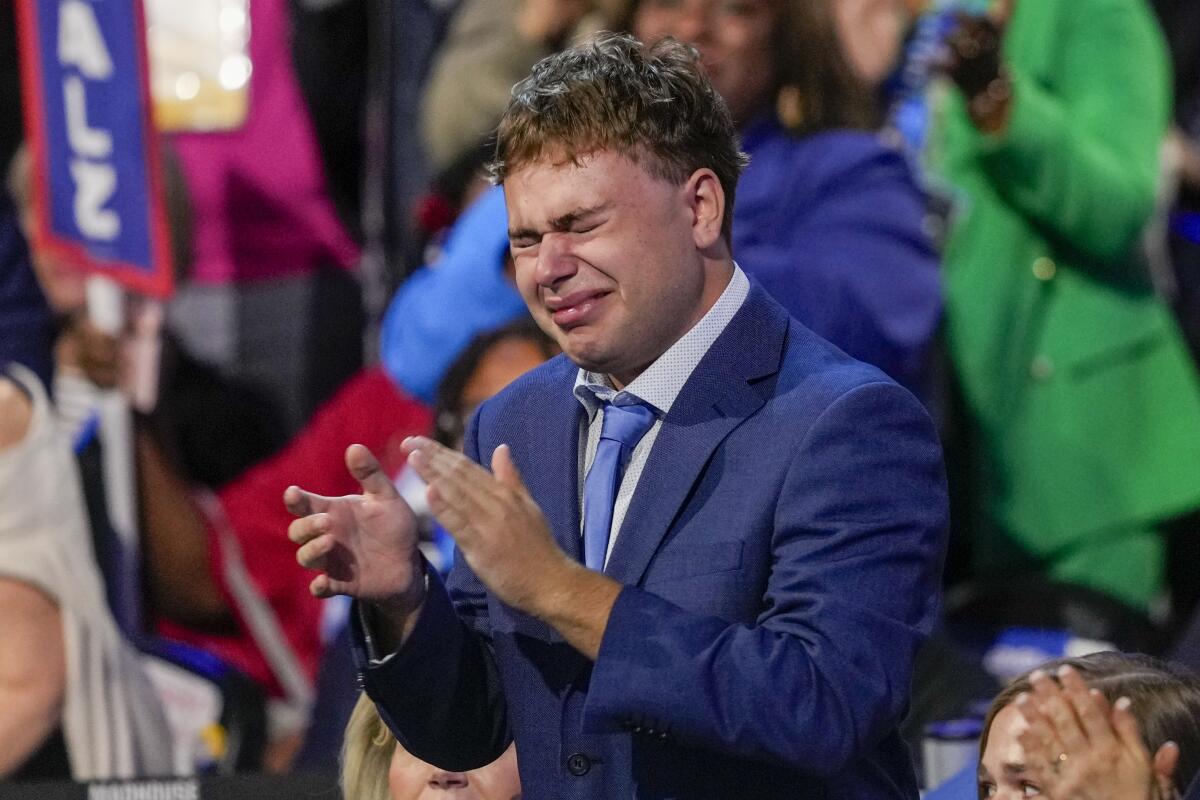
After Walz that night described Gus, his daughter, Hope, and his wife, Gwen, as “my whole world,” Gus, who has a condition called nonverbal learning disorder, rose to his feet, pointed toward the stage and said, “That’s my dad!” as tears ran down his face.
“It was just such a visceral, emotional moment that I’m just — I’m grateful I got to experience it, and I’m so proud of him,” Walz told Bash.
Gus Walz, the 17-year-old son of Minnesota Gov. Tim Walz, has nonverbal learning disorder. He’s one of millions of American kids with NVLD, which has been described as the opposite of dyslexia.
Walz said he hoped the moment signaled that the nation’s bitter politics “can be better” and “can be different.”
“We can show some of these things,” he said, “and we can have families involved in this, and I hope people felt that out there, and I hope they hugged their kids a little tighter because you just never know. Life can be kind of hard.”
- Share via
Harris says she was touched, humbled by photo of niece during DNC
The interview ended with Kamala Harris asked to describe her emotions on seeing a picture of one of her young nieces looking up at her as she delivered her acceptance speech at the Democratic National Convention.
Harris first tried to make clear to CNN’s Dana Bash that she didn’t want to be viewed just through a lens of race and gender, then acknowledged how moving the photo was to her.
“You know, listen: I am running because I believe that I am the best person to do this job at this moment, for all Americans, regardless of race and gender,” Harris said. “But I did see that photograph, and I was deeply touched by it. ... It’s very humbling in many ways.”
Bash wondered if the niece had talked to her afterward. Harris responded with a big laugh and replied, “Oh, she had a lot to talk about!”
- Share via
Walz defends his military service but doesn’t directly address question about it
Minnesota Gov. Tim Walz, the Democratic vice presidential nominee who has come under fire from Republicans who accuse him of misrepresenting his military service, defended his record Thursday, though he did not directly answer a question about falsely implying that he had carried a weapon in a theater of combat.
Though the Democratic campaign has said Walz, who served for nearly a quarter-century in the National Guard and retired in 2005 before he ran for Congress, misspoke, he did not directly answer a question by CNN’s Dana Bash about criticism of his implication that he served in a war zone.
In a letter, 50 Republican lawmakers who are military veterans accuse Walz of lying about his service, continuing attacks by Trump campaign.
“Well, first of all, I’m incredibly proud. I’ve done 24 years of wearing the uniform of this country, equally proud of my service in a public school classroom [and in] Congress or [as] governor,” he said. “My record speaks for itself, but I think people are coming to get to know me. I speak like they do. I speak candidly. I wear my emotions on my sleeves.”
He added that his record speaks for itself.
- Share via
Walz: ‘I certainly own my mistakes when I make them’
Minnesota Gov. Tim Walz was asked about two parts of his personal story that have raised questions since he was announced as Vice President Kamala Harris’ running mate.
Walz has inaccurately described the fertility treatments used by him and his wife to conceive their children in the past as IVF, when it was a different kind of treatment known as IUI.
In addition, some of Walz’s campaign staffers in his race for a House seat in 2006 were found to have given false information about a 1996 drunk driving incident, in which he ultimately pleaded guilty to reckless driving.
Minnesota Gov. Tim Walz formally accepts his party’s nomination for vice president on the third night of the Democratic National Convention.
CNN’s Dana Bash asked Walz about both discrepancies, and asked him what he would say to voters “who aren’t sure whether they can take you at your word.”
Walz said he has “been very public” about his past mistakes. “I certainly own my mistakes when I make them,” he said.
“I think people know who I am. They know that record. They’ve seen that I’ve taught thousands of students. I’ve been out there,” Walz said.
He said he spoke publicly about his family’s infertility issues “because it’s hell, and families know this.” He also said he didn’t think American families were “cutting hairs” between IVF and IUI, but were comparing Harris’ and his positions in support of fertility care and abortion rights against Republican efforts to restrict both.
- Share via
On immigration, Harris says: ‘We have laws that have to be followed and enforced’
Asked about record numbers of illegal border crossing since she and President Biden took office, Vice President Kamala Harris defended the work she did to address the root causes of migration from Guatemala, Honduras and El Salvador — work she took on at the president’s request.
Because of her work, she said, there have been “historic investments by American businesses in that region,” and the number of immigrants from there “has actually reduced since we began that work.”
Harris said that, if she were elected, she would sign bipartisan border legislation that Senate Republicans killed earlier this year after Trump signaled opposition to it.
“Donald Trump got word of this bill that would have contributed to securing our border, and because he believes that it would not have helped him politically, he told his folks in Congress: ‘Don’t put it forward,’” Harris said. “He killed the bill. A border security bill that would have put 1,500 more agents on the border.”
Kamala Harris didn’t want to take on the immigration portfolio as vice president in the Biden White House, an unwinnable assignment.
The National Border Patrol Council, the union that represents agents, endorsed the bill.
“They know they’re working around the clock, and 1,500 more agents would help them,” she said.
“So, you would push that legislation again?” Bash asked.
“Not only push it,” Harris said, “I would make sure it comes to my desk, and I would sign it.”
Harris said there should be “consequences” for people who cross the border illegally because “we have laws that have to be followed and enforced.”
“Let’s be clear,” she said, “in this race, I’m the only person who has prosecuted transnational criminal organizations trafficking in drugs, guns and human beings. I’m the only person in this race who actually served [in] a border state as attorney general to enforce our laws, and I would enforce our laws as president going forward.
“I recognize the problem,” she said.
- Share via
Harris signals no significant shift from Biden policy on Gaza
Asked about the war in Gaza, Harris signaled no significant change in policy from the Biden administration.
She reiterated being “unequivocal and unwavering in my commitment to Israel’s defense and its ability to defend itself.” She talked about the horror of murder and rape in the Oct. 7 attack by Hamas, which killed 1,200 people.
But Harris also said that “far too many innocent Palestinians have been killed” and that negotiations had to continue to reach a peace deal and eventually the long-discussed “two-state solution” that would make a safe homeland for both Israel and Palestinians.
“We have to get a deal done — when you look at the significance of this, to the families, to the people who are living in that region,” Harris said, “a deal is not only the right thing to do to end this war, but will unlock so much of what must happen next” — including the two-state outcome.
A comparison of Biden and Trump on Mideast policy. The biggest disparity between the two candidates may be their attitude toward Palestinians.
- Share via
No fracking ban, Harris says: ‘I will keep my word’
Fracking — the hydraulic fracturing of stores of natural gas or oil — was among the early topics raised by CNN’s Dana Bash, who asked Harris about her changing views on the controversial method of extracting natural resources.
In 2019, Bash noted, Harris came out against fracking while competing in the Democratic presidential primary, saying that “there was no question” she was in favor of banning it. But Harris said that since 2020 — the year after she ended her run for the presidency — her position has not changed: She does not support a ban.
“In 2020, I made very clear where I stand, we are in 2024, and I have not changed that position — nor will I going forward,” she said. “I’ve kept my word, and I will keep my word.”
Fracking is a major issue in Pennsylvania, arguably the most significant battleground state. Over the last few decades, there has been a boom in energy resources extraction there, creating jobs and giving a boost to the state’s economy.
When Bash asked what made Harris change her position, she pushed back, saying, “My values have not changed,” and she highlighted the “clear crisis” brought on by climate change. She said that the Biden administration had created 300,000-plus new clean energy jobs.
“That tells me, from my experience as vice president, we can do it without banning fracking,” she said.
- Share via
‘Help them buy a car seat, baby clothes, a crib’
Vice President Kamala Harris said one of her “highest priorities” on her first day in office, were she elected, would be “to support and strengthen the middle class.”
Financial struggles in part due to inflation are a major election issue for many American families, and something former President Trump has also focused on addressing.
Harris said she would address those issues by building what she has called an “opportunity economy” — including by driving down “the cost of everyday goods,” investing in small businesses and investing in American families by “extending the child tax credit to $6,000 for families for the first year of their child’s life, to help them buy a car seat, baby clothes, a crib.”
She said she would also focus on building more affordable housing, which she called “a big issue in our country right now.”
Both Harris and Vance say they want to boost the popular child tax credit. The move could reduce child poverty rates, but could also be expensive.
Minnesota Gov. Tim Walz, Harris’ running mate, said he was “excited” about Harris’ agenda.
“Many of these things that the vice president is proposing are things that we share in values, and the child tax credit’s one we know that reduces childhood poverty by a third,” Walz said.
He said Minnesota already has such a credit, and “to have a federal partner in this” would have an “unbelievable” impact.
- Share via
Harris on Trump’s race comments: ‘Same old, tired playbook’
Vice President Kamala Harris declined to lash out at former President Trump for falsely claiming that she recently “happened to turn Black” during her first major interview since accepting the Democratic presidential nomination.
“Same old, tired playbook,” Harris, a Black American of Indian and Caribbean descent, told Dana Bash on CNN in an interview aired Thursday evening. “Next question, please.”
During a National Assn. of Black Journalists interview, Trump said of Kamala Harris, ‘I didn’t know she was Black until a number of years ago, when she happened to turn Black.’
Harris’ public stance is similar to the tightrope walked by candidates of color and women. While some voters are euphoric about the historic nature of her candidacy, some moderate white voters are less concerned about such issues.
“She was a DEI hire,” Rep. Harriett Hageman, a Wyoming Republican, said recently.
Harris is walking a familiar path tread by Hillary Clinton in 2016 and 2008, and Barack Obama in 2008. The historic nature of their respective candidacies excited key segments of the Democratic base. But they often let surrogates speak about such matters.
- Share via
Harris says she would target price gouging, expand tax credits
CNN’s Dana Bash asked Vice President Kamala Harris to explain to Americans how she would bring down inflation that many said was hurting them.
Harris first touted the job she and President Biden did in helping the economy recover from the COVID-19 epidemic and the economic collapse that came with it.
“The economy had crashed, in large part, all of that because of mismanagement by Donald Trump of that crisis,” Harris said. “When we came in, our highest priority was to do what we could to rescue America, and today, we now have inflation at under 3% ... our policies led to the reality that America recovered faster than any wealthy nation around the world.”
Vice President Kamala Harris, in a speech in North Carolina, promotes a broad set of economic proposals promising new tax breaks and to lower costs for consumers.
But Harris acknowledged that more needs to be done to bring down prices that are too high, in particular for groceries.
“My agenda includes what we need to do to bring down the price of groceries, for example, dealing with an issue like price gouging,” Harris said.
She also said she would extend child tax credits to help families “to be able to take care of their children in their most formative years.” She also said she would support a tax credit of $25,000 for first-time home buyers to allow Americans “to put a down payment on a home, which is part of the American dream.”
She also cited the Democrats’ previous initiatives to previously cap the price of insulin and to put a $2,000-a-year limit for seniors on out-of-pocket expenses for medicine.
“I’ll say that that’s good work. There’s more to do, but that’s good work,” Harris said.
- Share via
Trump: ‘She didn’t look like a leader to me’
Even before the interview went on the air, former President Trump responded to excerpts released by CNN. No surprise, he did not give Harris high marks.
“She was sitting behind that desk, this massive desk, and she didn’t look like a leader to me,” Trump said at a town hall meeting, hosted by his ally, former Democratic Rep. Tulsi Gabbard. “I’ll be honest, I don’t see her negotiating with President Xi of China. I don’t see her with Kim Jong Un.”
Trump has never met face-to-face with Harris, as she acknowledged in her interview with CNN’s Dana Bash.
- Share via
Harris’ Cabinet pledge evokes an idea dating back to Lincoln
Vice President Kamala Harris’ promise to nominate a Republican to her Cabinet if she wins in November is a fresh nod to bipartisanship using an old idea.
When President Obama was elected in 2008, he famously cited as inspiration for his own nomination process the presidential historian Doris Kearns Goodwin’s book “Team of Rivals,” about Abraham Lincoln’s decision to build out his Cabinet with political rivals after his election in 1860.
The nation may seem politically polarized today, with Democrats and Republicans having little in common. Of course, Lincoln was staring down civil war.
Obama nominated multiple Republicans to his Cabinet, including Ray LaHood, who became his secretary of Transportation. Obama retained Robert Gates, who was President George W. Bush’s secretary of Defense, and later nominated another Republican for the post, Chuck Hagel. He also nominated his chief rival from his own Democratic Party — Hillary Clinton — as secretary of State.
Former Defense Secretary Robert Gates chronicles his life in Washington from 2006-11 in the new memoir, “Duty.”
Neither President Trump nor President Biden nominated officials from the opposing party to high-profile roles in their Cabinets, though they did make cross-party appointments within their administrations. Biden said he wanted his Cabinet to “look like the country” and did nominate diverse candidates — just not politically.

Trump did signal room in his future administration, if he wins, for at least one rival last week, when he brought Robert F. Kennedy Jr. out at a campaign rally in Arizona.
Earlier that day, Kennedy had announced he was suspending his own presidential campaign — at least in some states — and throwing his support behind Trump. He attributed his decision in part to Trump promising to listen to Kennedy’s ideas if he wins back the presidency.
Kennedy said Trump brought up Lincoln’s “team of rivals” during their initial meeting, as an example of how their arrangement might work.
“That arrangement would allow us to disagree publicly and privately and furiously if need be on the issues over which we differ, while working together on the existential issues upon which we are in concordance,” Kennedy said.
Robert F. Kennedy Jr. suspended his presidential campaign and endorsed former President Trump.
Kennedy, the scion of the nation’s most famous Democratic family, originally entered the race as a Democrat before his switch to an independent. Neither he nor Trump have outlined a specific role for Kennedy in another Trump administration, though Trump has said he “probably would” find Kennedy a role.
Kennedy had also sought an audience with Harris, but was turned down.
History has looked kindly on Lincoln’s decision to bring rivals into his Cabinet, and more recent gestures at bipartisanship in Cabinet appointments have been similarly applauded. But the approach is not without risk.
As some historians have noted, Lincoln suffered repeated disloyalty and political headaches at the hands of his so-called rivals, which harmed his agenda and the Union war effort. Gates offered harsh critiques of Obama after he left the administration.
- Share via
Harris pledges to name a Republican to her Cabinet if elected
Vice President Kamala Harris defended her reversals on policies about banning fracking and decriminalizing illegal border crossing, saying that her core beliefs have never wavered, in her first extensive interview since accepting the Democratic presidential nomination.
“I think the most important and most significant aspect of my policy perspective and decisions is my values have not changed,” she said, according to excerpts released by CNN of an interview that is scheduled to air Thursday evening.
If elected president, Harris pledged to name a Republican to her Cabinet, as Democratic and Republican presidents have done with members of the opposite party. (See Roy LaHood and Norm Mineta, who served as Transportation secretary for former Presidents Obama and George W. Bush, respectively.)
“I think it’s really important. I have spent my career inviting diversity of opinion. I think it’s important to have people at the table when some of the most important decisions are being made that have different views, different experiences,” Harris said. “And I think it would be to the benefit of the American public to have a member of my Cabinet who was a Republican.”
Harris also dismissed former President Trump’s false claim that she had only recently claimed her Black ancestry.
During a National Assn. of Black Journalists interview, Trump said of Kamala Harris, ‘I didn’t know she was Black until a number of years ago, when she happened to turn Black.’
“Same old, tired playbook,” she said. “Next question, please.”
- Share via
Harris and Walz interview begins at 6 p.m. PDT
The first major media interview of Vice President Kamala Harris since she took over the Democratic ticket and received her party’s nomination for president is upon us.
Harris and her vice presidential running mate, Minnesota Gov. Tim Walz, will answer questions together in a prerecorded prime-time special with CNN chief political correspondent Dana Bash at 6 p.m. PDT Thursday.
Reporters for The Times will be following the interview and reporting on Harris’ and Walz’s answers in real time for readers to follow along.
The interview is particularly significant given the short race between Harris and former President Trump, which began only last month when President Biden dropped out of the race and endorsed Harris.
The pressure is growing for Vice President Kamala Harris to release more details on her plans if she is elected president, especially in areas where she may differ from President Biden.
It is also significant because Harris has faced criticism from Trump and other Republicans — as well as some members of the media — for not giving a planned media interview since she became the nominee. They say she has not spoken often enough off-script about her policies and how they might differ from those of the Biden administration.
Harris has been touring swing states and giving stump speeches before large crowds, and gave a well-received speech at the Democratic National Convention last week. She has also answered some questions from reporters during impromptu press gaggles.
However, she has not sat for any lengthy interviews or held a news conference since being elevated to the top of the ticket.
Harris appearing with Walz — rather than solo — for her first postconvention interview has also been criticized by Trump and Republicans, though that is a typical arrangement.
Vice President Kamala Harris and her running mate, Minnesota Gov. Tim Walz, are kicking off a two-day bus tour in Georgia that will snake through rural areas.
It’s unclear what questions Bash will ask. She was previously praised by Trump for her job co-moderating — with CNN anchor Jake Tapper — the June 27 presidential debate between Trump and Biden that tanked Biden’s reelection bid by raising serious concerns about his mental acuity and fitness for office for another four years.
Trump on Thursday morning wrote on his social media platform that Bash “has a chance at greatness” if she gives “a fair but tough interview” that exposes Harris “as being totally inept and ill suited” for the presidency.
“How cool would that be for Dana and CNN???” Trump said.

